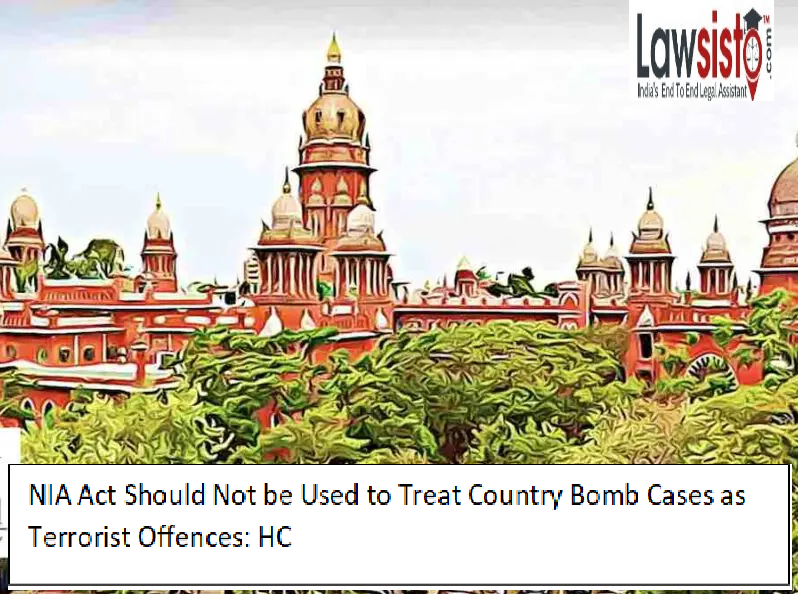Latest News
NIA Act Should Not be Used to Treat Country Bomb Cases as Terrorist Offences: HC

NIA Act Should Not Be Used to Treat Country Bomb Cases as Terrorist Offences: HC
Concerns were expressed by the high court of madras about the difficulties which are caused only by sending all the cases which involve offenses under the National Investigation Agency (NIA) Act to special courts that are notified under the NIA Act.
It was further stated that in Tamil Nadu the explosive substances act is routinely invoked gangster crimes as the ordinary gangs don’t use the common knives anymore but they use the country bombs.139 FIRs have been noted in the year 2019 with the offenses under the explosive act.
The Hon'ble Court made these remarks while hearing a referred question about whether a sessions court's rejection of bail under the UAPA might be appealed under the NIA Act even if the state police investigated the case. Following the apex court verdict in the case of Bikramjit Singh vs. the State of Punjab, the court declared that such challenges can only be brought under the NIA Act. Some of the observations were also made by the bench. Bench’s attention drew by the counsel for the petitioner to the point that as per the NIA act the explosive substances act was a scheduled offense. In routine bomb cases where UAPA was invoked this leads to the final reports before the sessions court. All FIRs under the Explosive Substances Act should be reported to the Central Government if the State police follow the rigorous mandates of the NIA Act. As a result, the Central Government would be inundated with reports from various State Governments around the country, which they will have to study and decide on a case-by-case basis as to which crimes should be handled by the NIA and which should be left to the State Police to investigate. "In our considered opinion, the fundamental aim and intent of the NIA Act would be destroyed if all and sundry run-of-the-mill country bomb cases are classified as terrorist offenses and referred to Special Courts/Session Courts for trial," the Court noted. "The only aim behind the NIA act of 2008 was to expedite the trial of serious offenses, which all are mentioned in the schedule, which would be thwarted if one Court is jurisdictionally overloaded with many enactments providing special jurisdiction," it said. This is a practical concern that, if not resolved quickly, will contradict the fundamental purpose of having Special Courts," the Court stated.
"Another inconsistency was also been found apart from the above. in that when the C.B.I. is investigating a scheduled offense, it comes neither under the category of N.I.A. nor under the category of State agency, resulting in the NIA Act not applying to such situations." Only when the CBI's final report reveals a scheduled offense in the hypothetical case alluded to above will it have to be filed before a regular jurisdictional Magistrate. Mr. R. Sankaranarayanan, Additional Solicitor General, stated he will bring these issues to the attention of the Union Ministry of Law and Justice. Finally, the hope and the confidence were expressed by the court that whatever the key parties will be there they will investigate the issues involved in the case or stated in the case.
Document:



































































































